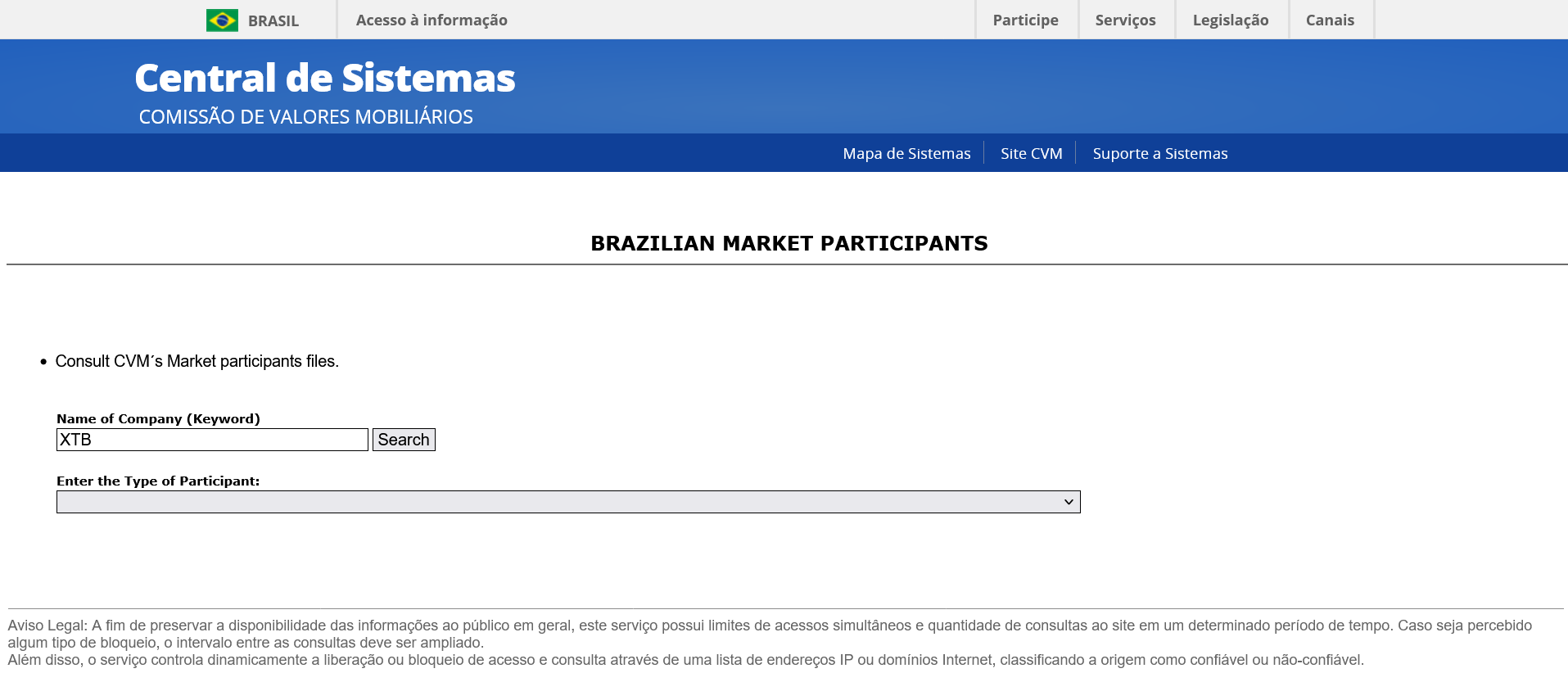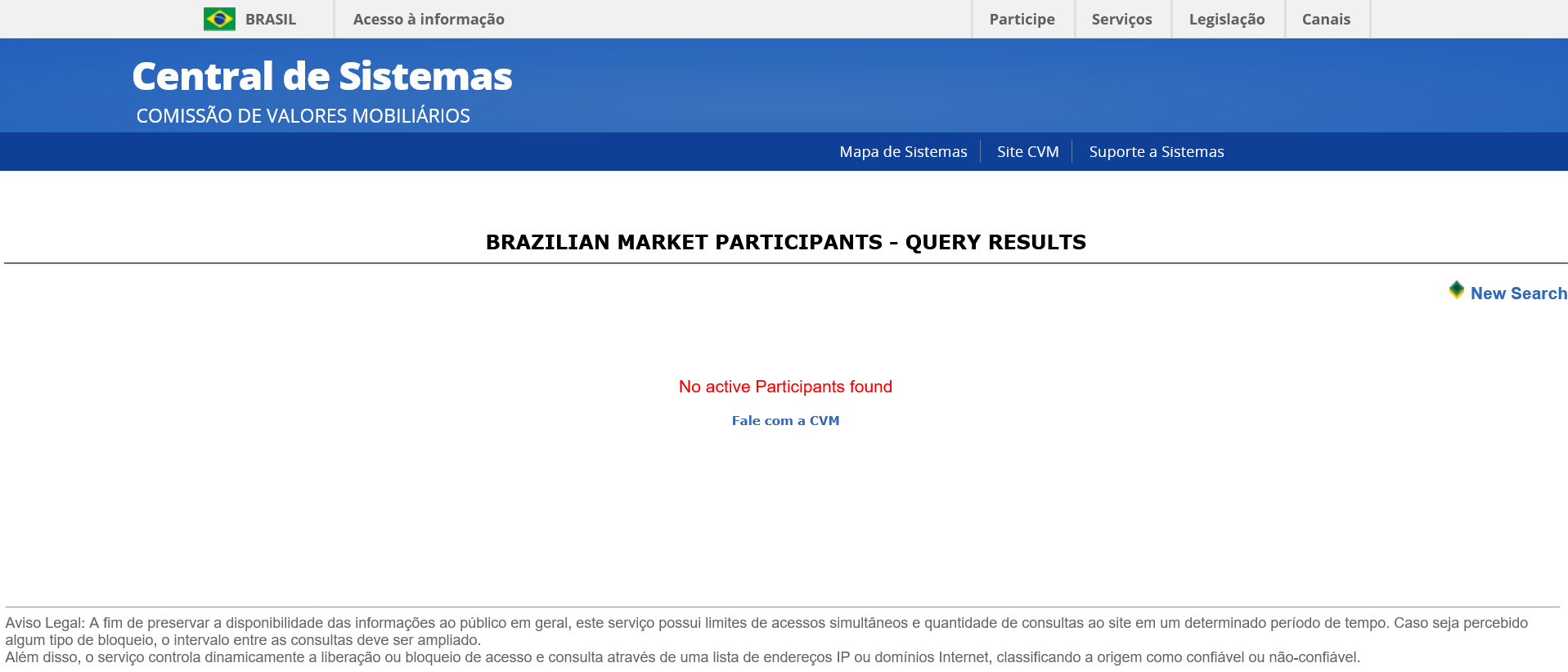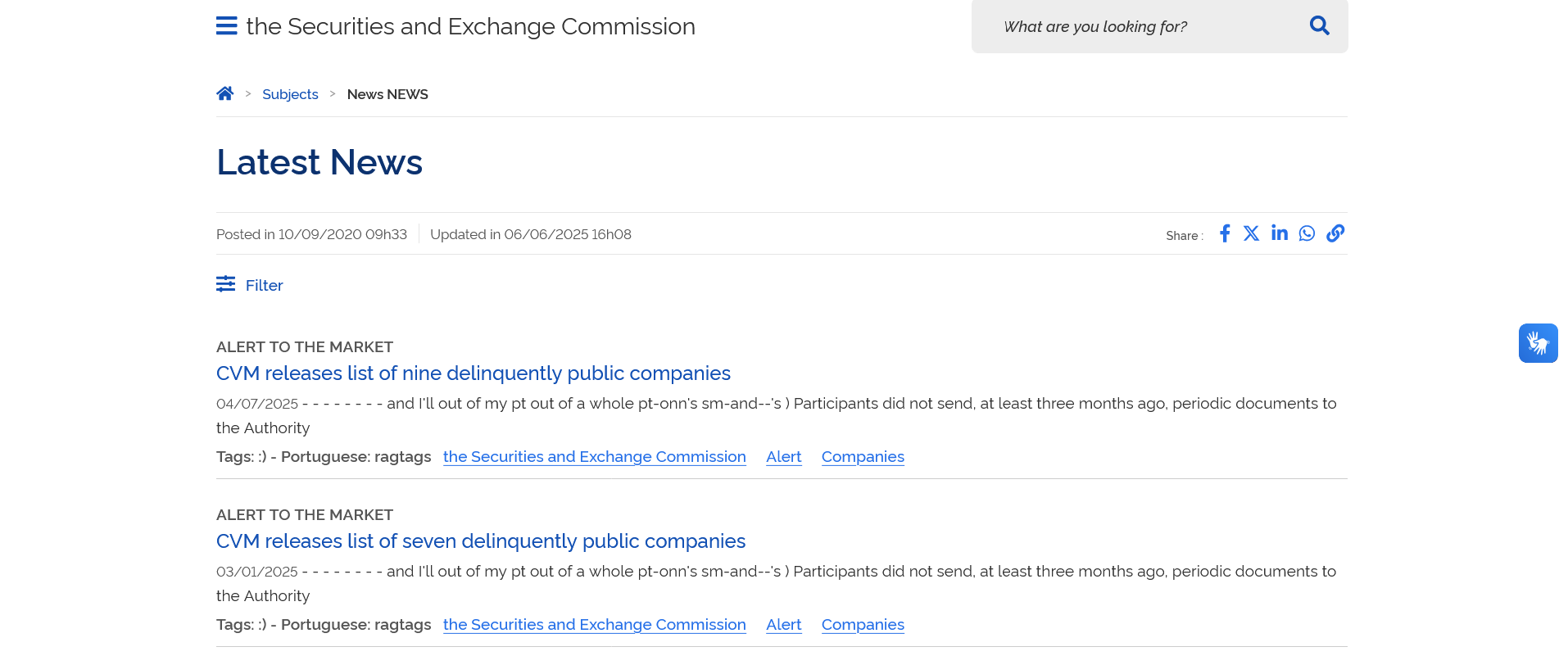Best Securities and Exchange Commission of Brazil (CVM) Regulated Brokers 2026
We’ve personally tested and ranked the top brokers regulated by the Securities and Exchange Commission of Brazil (CVM), ensuring high standards of trust and reliability.
Filters
How BrokerListings.com Selected the Top CVM Brokers
To identify the best brokers regulated by Brazil’s CMV, we:
- Verified each firm’s regulatory status to ensure compliance with Brazil’s laws.
- Applied our broker rating methodology that records over 200 data points, including platform usability, spreads, BRL accounts, and client protections.
- Tested each shortlisted broker beyond regulation, also looking at the tools and user experience for active traders.

What Is The CVM?
The Comissão de Valores Mobiliários (CVM) is one of the bodies responsible for regulating Brazil’s financial markets, and ensuring that industry participants comply with local laws.
Established in 1976, the organization – whose name translates as the Securities and Exchange Commission in English – is one of four regulators that co-ordinate financial sector oversight in the Latin American country.
These are:
- The CVM.
- The Banco Central do Brasil (BACEN), Brazil’s central bank.
- The Superintendência de Seguros Privados (SUSEP), or Superintendence of Private Insurance.
- The Superintendência Nacional de Previdência Complementar (PRESIC), or National Superintendence for Complementary Pensions.
The CVM’s role is to regulate and supervise Brazil’s securities markets, and it is “responsible for business conduct and market regulation of intermediaries and the other secondary markets, equity, derivatives and non-governmental debt,” according to Brazil’s Ministério da Fazenda (Ministry of Finance).
Under BrokerListings’ broker regulator ranking system, the CVM has been designated Category B status. This means investors can expect a good level of protection from bad business practices and fraudulent entities.
What Powers Does The CVM Have?
The CVM is given the power to regulate and observe financial markets, intermediaries, and issuers of securities under Law 6.385/76, also known as the Securities Law.
The organization regulates and supervises market participants, and may take enforcement action when it deems that individuals and companies have fallen short of industry standards. Along with the Banco Central do Brasil, it is responsible for issuing licenses for market intermediaries to trade.
According to the Ministério da Fazenda, the CVM “[may] obtain information on markets, institutions, financial products, customers and parties involved in securities transactions, carry out investigations, impose sanctions, suspend trading of securities, and prohibit improper market conduct.”
Pro tip: The CVM doesn’t have powers to safeguard investors from fraudulent activities involving the buying and selling of government securities.
In March 2025, the CVM issued financial penalties totaling roughly R$371.5 million (Brazilian real) to a financial services company and associated individuals “for the alleged irregular exercise of the activity of portfolio management of securities without the authorization of the CVM… and for alleged practice of fraudulent operation in the securities market.”
It fined Miner Ltda EEP approximately R$180.1 million for irregular securities portfolio administration and fraudulent practices. It also slapped multi-billion-real fines on a number of individuals for the same offences, and on others for “creating artificial conditions of demand, supply or price of securities.”
What Rules Must A CVM Broker Follow?
Brokerages in Brazil’s financial markets must follow a broad range of rules to remain compliant. These include:
- Completing ‘Know Your Customer’ paperwork in order to ascertain risks to the customer; to protect the broker and its employees; and to prevent money laundering, the financing of terrorism, and financing of the proliferation of weapons of mass destruction.
- Advising clients of transaction fees and other charges before it begins executing trades on their behalf.
- Confirming to the client that a trade has been executed, and the conditions under which it was carried out, in a timely manner.
- Implementing procedures to identify and avoid against conflicts of interest involving the company, any people connected to it, and its clients.
- Keeping comprehensive records, including on trades which must be kept for a minimum of 10 years.
- Adequately train its staff to carry out their duties.
- Implementing robust internal controls and procedures to protect clients and their funds.
How Can I Check If A Brokerage Is CVM Regulated?
Checking that a broker is CVM-licensed is an essential step in protecting your capital and personal information.
Unfortunately, the regulator does not maintain a public database of authorized companies. This sets it aside from many other respected global regulators.
Confusingly, the CVM provides an online Market Participants search facility, but this does not provide accurate information.
To illustrate this, my attempt to ascertain the regulatory status of XTB – which operates in Brazil via a partnership with CVM-authorized Finvest DTVM Ltda – drew a blank, as you can see below.

Typing XTB into CVM’s online search directory. Source: CVM

My search for XTB yielded no results. Source: CVM
Despite this, it’s not impossible for traders and investors to get the information they need. They can ask the Office of Investor Assistance and Sustainable Finance directly by contacting them through:
- Telephone, on 55 11 2146-2070.
- E-mail, using the address soi@cvm.gov.br.
Pro tip: The CVM does publish a warning list of ‘delinquent companies’ on its website, however, to help individuals avoid bad actors.
The main webpage and all linked pages are only published in Portuguese. But English speakers should be able to get around this by using a translate tool in their browser.

A list of warnings on the CVM website. Source: CVM
Bottom Line
The CVM’s regulatory regime isn’t as watertight as those in other parts of the world. It also doesn’t make checking a brokerage’s legal status as straightforward as other global regulators often do.
However, investors and traders can still expect a good level of protection from poor business practices and bad actors. It’s important to check that the broker you’re considering is CVM approved before opening an account or even making contact.
Article Sources
Comissão de Valores Mobiliários (CVM) – Ministério de Fazenda (Ministry of Finance)
Brazilian Financial Sector Regulatory Structure – Ministry of Finance
Securities Law – Ministry of Finance